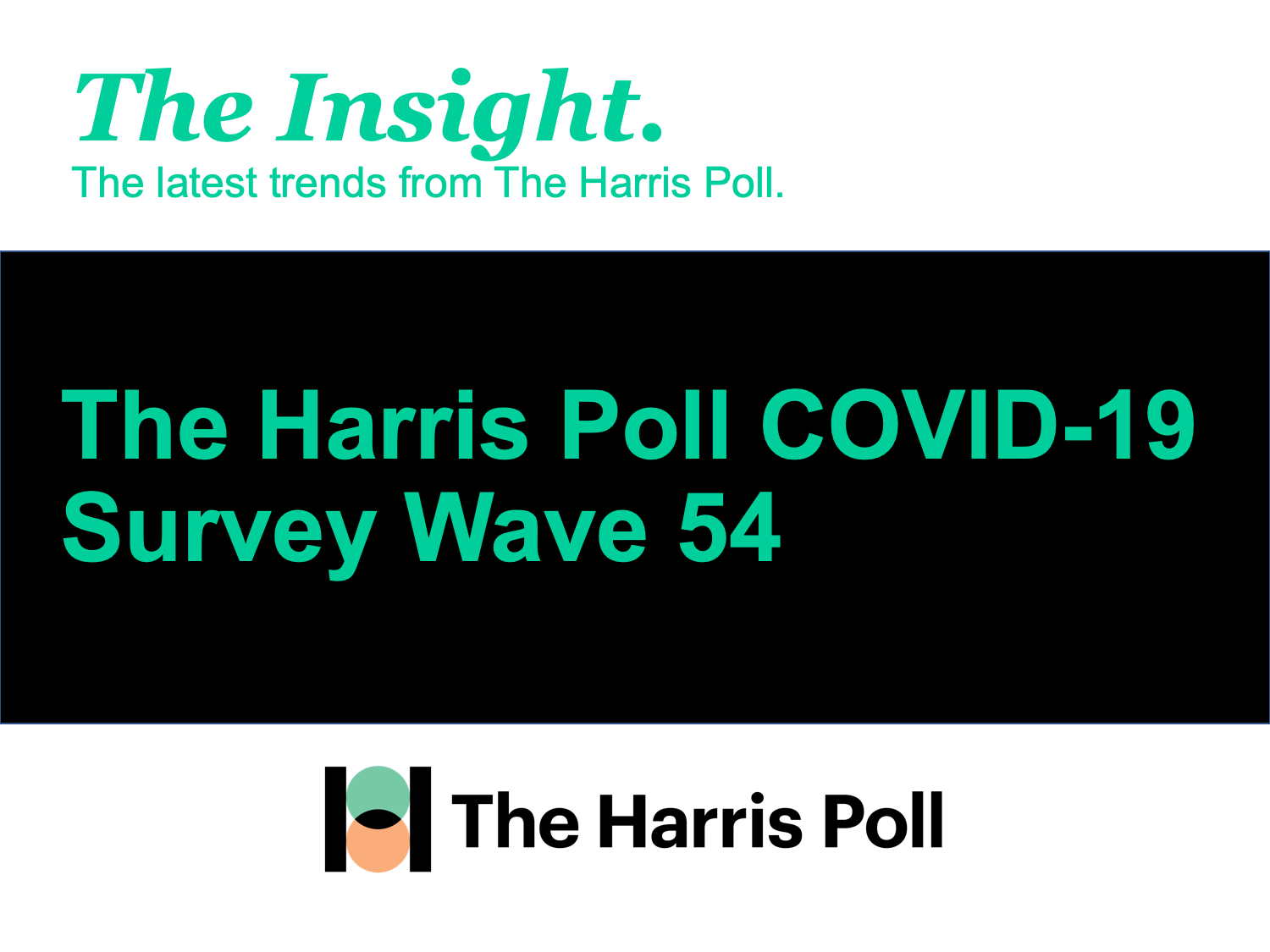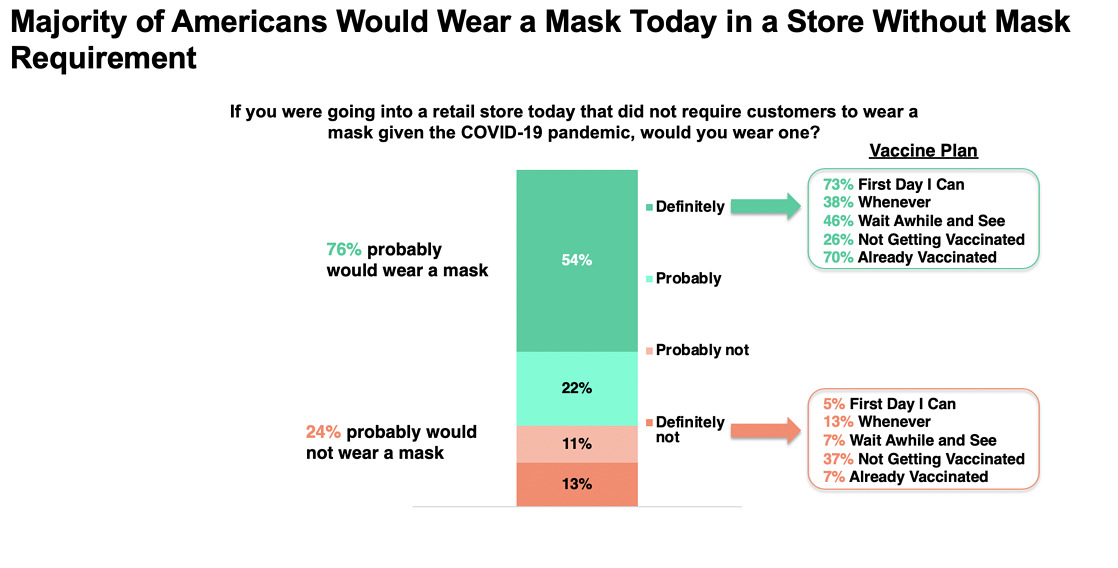Brief • 4 min Read

In The Harris Poll COVID-19 Tracker (Week 54) fielded March 5th to 7th, 2021 among 1,963 U.S. adults, we look at the CDC’s next steps for vaccinated people, where Americans think we are in the pandemic, the future of socializing post-pandemic, who gets final say on mandating masks, and the pent-up demand for the spring.
As a public service, our team has curated key insights to help leaders navigate COVID-19. Full survey results, tables, and weekly summaries can be accessed for free at The Harris Poll COVID-19 Portal. We will continue to actively field on a regular cadence to track the shifts in sentiment and behaviors as the news and guidelines evolve.
Harris Poll Data Informs CDC’s Guidelines for Vaccinated People
On Monday, the CDC issued highly anticipated guidelines for Americans who are fully vaccinated against COVID-19. We have been proud to work in partnership with the CDC since August in helping to navigate public opinion around the pandemic and our insights helped to inform the CDC’s guidance on the easing of restrictions for these Americans.
- Prior to the CDC’s announcement, vaccinated people weren’t being reckless: they were less likely than the general public to feel comfortable visiting friends and family without a mask (32% vs 37% of the general public) or shopping in a store without a mask (18% vs 24%). Those vaccinated are also more hesitant to travel – only (18%) would feel comfortable flying on a plane and (22%) feel comfortable staying in a hotel (vs 20% and 27% of the general public, respectively).
- And they were still taking precautions: Last week, we found (92%) of those vaccinated were wearing a mask more often or the same relative to a month ago (vs 88% of the general public) and were just as likely as the public to be only gathering indoors with people from their household (83%).
- How do those who are already vaccinated feel? (29%) said their primary emotion was feeling relieved they are now protected, while (27%) felt lucky they were one of the first to be inoculated and (20%) said it gave them optimism that the pandemic will end soon. Only (10%) said they were impatient; they have to wait for their friends and family to be vaccinated and only (7%) said they are frustrated they are still restricted from resuming normal activity.
Takeaway: Normalcy and eased restrictions are being viewed as a critical motivator to get the vaccine: part of the CDC’s decision to ease restrictions on vaccinated Americans is to encourage people to get innoculated: “Relaxing certain prevention measures for fully vaccinated persons may be a powerful motivator for vaccination, and thus should be an important goal of the U.S. vaccination program.”
Americans Say We Aren’t Out of the Woods Yet
Last week, we noted how Americans are increasingly optimistic the end of the pandemic is in sight. But most Americans are still cognizant that we have a long way to go before we are in the clear and are willing to wait until the crisis phase is over before lifting restrictions.
- Are we out of the woods yet? (57%) say today we are not out of the woods yet and are just back to where we were during summer 2020, while (43%) would describe the current state of the pandemic as our current level is nowhere near as bad as previous levels because all vulnerable people are being vaccinated.
- Americans prefer to wait until after hospitalizations are low and everyone is able to get a vaccine before “normal”: (30%) say 100% of COVID-19 restrictions should be lifted only after a consistent decline in cases and hospitalizations that brings them to a negligible rate for a period of time, while (28%) say it should be after anyone in the general public is able to get a vaccine if they want one and only (9%) say it should be after anyone in a priority group is able to get vaccinated. Only (19%) say they should be lifted right now.
- In the meantime, Americans are content with current restrictions: (61%) of Americans say their local restrictions to enforce social distancing are “about right” (including 57% of Republicans and 64% of Democrats). Only (20%) say their restrictions are too lenient, while (19%) say their restrictions are too strict.
Takeaway: As reported in the New York Post, our tracking data showed last week that the fear of dying from COVID dipped below (50%) for the first time since July… “While Americans remain vigilant over the pandemic,” Harris Poll CEO John Gerzema said, “it is an encouraging sign to see greater acceptance of the vaccine, a belief that there is light at the end of the tunnel, and a declining sentiment in fear of dying from the virus.”
Socializing After a Year of Social Distancing
As restrictions begin to lift around the country, Americans are reconsidering their ideal way of socializing. At the beginning of the pandemic, many felt isolated by the new way of life dictated by the freshly implemented social distancing rules. A year later, with vaccinations ramping up and an end in sight, Americans are ready to explore what is now our new normal.
- Home is where the party is: Three-quarters (75%) of Americans said social distancing made them realize that they preferred small social gathers at home over at a bar or restaurant, while (72%) say they will miss the comfort of home and (58%) the creative side of hosting while socializing at home. Millennials miss the creativity the most (68%).
- The new normal for socializing: Although Ameircans have mainly been restricted to their homes, nearly half (48%) say that they will continue to socialize within the home in the future and (17%) said they would mostly go to bars or restaurants. More than one third (35%) say a mix of both is preferred. These sentiments are true across generations.
- But consumers won’t be hermits post-pandemic: (21%) have already resumed pre-pandemic levels of going out and there are benefits that come with going out such as meeting new people (51%), especially for Millennials (62%). Businesses that offer in-person services will have to think creatively how to blend the comfort of home entertaining with the connection that comes with going out.
- A new kind of passport: Organizations have touted the idea of vaccination passports to ensure safety when people can begin mingling in large crowds again. Six in ten (63%) support businesses using a ”vaccine passport” in which a customer would be required to show they received a COVID-19 vaccine or a recent negative COVID-19 test in order to do public activities such as fly on a plane or attend a major league sporting event. Although not a new concept, only four in ten (39%) are familiar with the idea of vaccine passports.
Takeaway: Americans are ready to socialize, but not in ways that resemble life as it was prior to March 2020. People are eager to get back to enjoying things like hugs with family members, trying out a new restaurant in town, and seeing their favorite band – but the last year has left its mark on our psyche.
Should the Mask Still Be Mandated?
States across the country are lifting mask mandates, shifting the decision to the individual consumer or business to decide if masks should be worn. In our most recent data, only (24%) of Americans are comfortable today shopping in a store without a mask.
- The Last Word: Nearly one-third (31%) say the company itself should have final say if masks are worn on their property, while (22%) say it should be left to the state government, (18%) the federal government, and (15%) the local government. Only (14%) say the customer should have final say, though Republicans are three times as likely as Democrats to say it should be left to the individual (21% vs 7%).
- Protecting employees, customers should be highest priority: Three-quarters (74%) say businesses should prioritize employees and other customers feeling safe from contracting COVID-19 by mandating masks while only (26%) say customers being able to decide to not wear a mask if they do not want to should be the higher priority. While a majority of both parties say employees and other customers should be the higher priority, Republicans are much more likely than Democrats to say the customer’s individual decision should be higher priority (39% vs 17%).
- Most (76%) Americans would wear a mask in a store even if they were not required to. But an age gap exists: Boomers (81%) and Gen X (79%) are more likely than Millennials (71%) and Gen Z (68%) to self-mask during the pandemic.
- Though the statewide mask mandate was lifted today in Texas, retailers such as Costco, Kroger, and Target will stick with required masks in their stores to protect their employees and customers as the COVID-19 pandemic continues.
Takeaway: Despite a small yet vocal constituency opposed to being required to wear masks in stores, businesses are right to maintain the trust of employees and customers by ensuring they feel safe during the pandemic.

Spring Is the New Christmas as Brands Prep for the Return of Roaring ‘20s Consumerism: Ad Age-Harris Poll
Spring is the new Christmas for marketers preparing to unleash media spending in anticipation of an explosive sales uptick as the weather warms and consumers rush to resume their everyday lives. The marketing industry is looking to spring, typically a time of rebirth and renewal, to reconnect with customers eager to get out and spend as COVID-19 vaccines roll out and the threat of the coronavirus diminishes. Our recent survey with Ad Age looks at what this means for brands:
- Vaccine Optimism: (30%) of households making $100,000 or more a year said they’ll spend more this spring compared to last; the majority of this group said the vaccine rollout has influenced this decision.
- The Return of Brick-and-Mortar: Shopping will extend beyond e-commerce to brick-and-mortar stores as consumers get comfortable again with in-person experiences. Some (62%) of consumers say they plan to shop in stores this spring at least once a week.
- Americans want to get back out: One-third (34%) of Americans plan to travel out of town this spring, while another (35%) plan to do so this summer.
Takeaway: “Right now, every brand is figuring out how to either retain their newly won customers or gain back lost ones,” says Mark Penn, chairman and CEO of MDC Partners. “The race is on, and meanwhile, consumers have fundamentally changed – they’re simply not going back to pre-COVID brand expectations.”
Subscribe for more Insights
Subscribe to our newsletter for the latest trends in business, politics, culture, and more.
Download the Data
This survey was conducted online within the U.S. by The Harris Poll from March 5 to 7, among a nationally representative sample of 1,963 U.S. adults.
Download
Subscribe for more Insights
Subscribe to our newsletter for the latest trends in business, politics, culture, and more.
Download the Data
This survey was conducted online within the U.S. by The Harris Poll from March 5 to 7, among a nationally representative sample of 1,963 U.S. adults.
DownloadRelated Content








